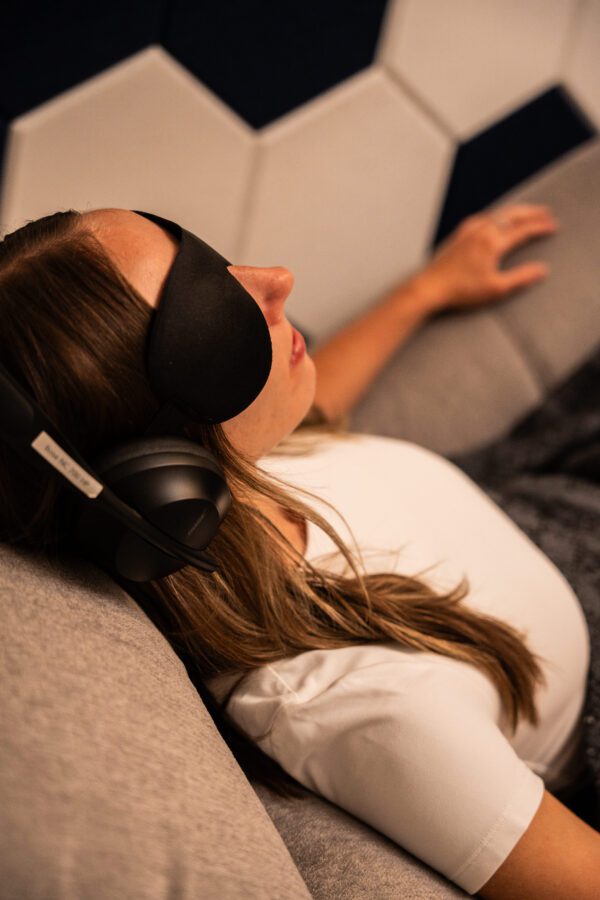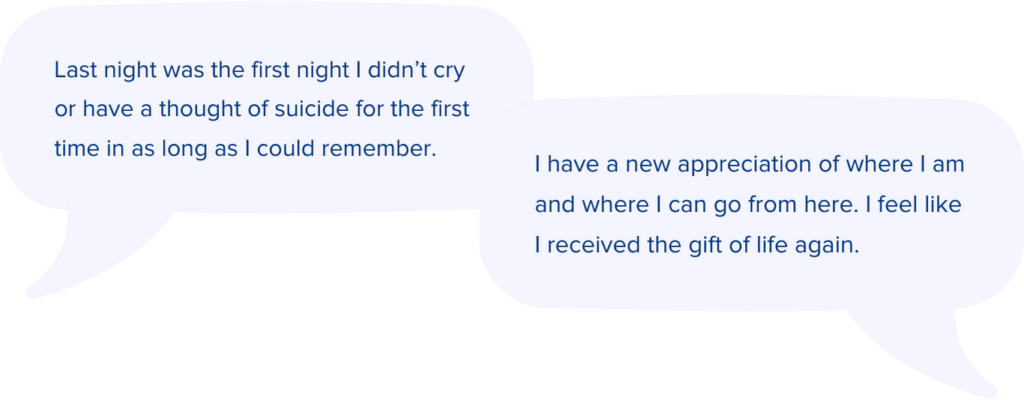
The feeling of freedom.
Odyssey is a treatment protocol that is driven by research and backed by data.
Odyssey Therapeutic Experiences uses intramuscular (IM) delivery as the primary route of administration.
IM ketamine has a fast onset, and is a deeper and more immersive experience. It is preferred in clinics for rapid, profound results and considered the gold standard for ketamine therapy.
We ask our participants to trust and commit to the process.
Please only enquire about Ketamine-assisted therapy if this resonates with you.

It’s time to finally feel better.
All 1st time clients do our Odyssey Intake and receive preparation and integration counselling. This is to ensure safety and produces the best results.
Odyssey Intake
After a referral is received, your Odyssey begins with an intake. Ketamine is not suitable for everyone, for your safety we have an intake process to ensure compatibility.
You will have a virtual consult with our intake team to understand your unique case, learn your history and determine if Odyssey is the right fit for you.
Meet a physician from our care team to review your medical history and any medications to ensure you are a physiological fit for ketamine treatment.
You receive access to our Odyssey Online Portal – a resource filled with guidance on what to expect with Odyssey and Ketamine-assisted Therapy – as well as holistic integration practices to support your long term healing.
Prep: Preparation is vital for achieving long term change. Make use of your Odyssey Online preparatory resources before your first session.
Integration: Odyssey does not end after your experience. Your integration practice is an important part of your long term healing. Make use of your online resources for practices like mindfulness, breathwork and meditation. And join us for in-person Mind + Body sessions at the centre.
$400
Financing available through Medicard or Cocopay
Odyssey Therapeutic Experience
Meet with your counsellor who will help you clarify your goals and intentions, and take steps needed to ensure you’re fully prepared for your journey.
Step out of the often repeated routines. Your care team supports you in a safe and comfortable environment as you journey with a therapeutic, perspective shifting experience of the Odyssey medicine – intramuscular ketamine.
Meet again with your counsellor to discuss your Ketamine Experience. Together, you’ll unpack the insights gained and identify which pieces can be integrated into your life – and the helpful, practical ways you can do so.
Prep: Preparation is vital for achieving long term change. Make use of your Odyssey Online preparatory resources before your first session.
Integration: Odyssey does not end after your experience. Your integration practice is an important part of your long term healing. Make use of your online resources for practices like mindfulness, breathwork and meditation. And join us for in-person Mind + Body sessions at the centre.
$1400
Financing available through Medicard or Cocopay

Care plan.
Each client will have a discussion with our expert medical team to determine the best care plan for your situation. Packages of 3 experiences with preparation and integration counselling are also available. The Care Team will assess eligibility for additional treatment options after the first treatment.
We encourage our clients to follow the therapeutic process as this yields the best results. Our Care Team can also collaborate with your existing therapist to determine the best path forward.
Odyssey functions differently from what you may know of medicine.
Unlike other common medications taken orally to temporarily mask symptoms, the Odyssey treatment protocol catalyzes perspective shifts that require the individual’s attentive participation and mindful action to achieve true results.
The experience creates an opportunity for a psychological opening that, when combined with specialized therapy and integration support, can foster lasting positive change. It works by temporarily altering brain function and perception, leading to profound shifts in consciousness that can facilitate deep emotional processing, increased introspection, and enhanced empathy and connectedness.

The peace you’ve been seeking.
Learn more about how Odyssey helped others and dramatically reduced depression scores for an extended period.
I had such a wonderful and insightful experience. The space is amazing and the staff are very knowledgeable and helped me with all my needs. I highly recommend.
The staff is very friendly and super knowledgeable. My treatment left me feeling rejuvenated and full of energy. I would highly recommend it to others.
Ketamine is a really incredible tool for healing and EntheoMed is delivering a really awesome service.

Frequently Asked Questions
Ketamine-assisted therapy (KAT) combines the use of ketamine with psychotherapy as a treatment for mental health and chronic pain. Ketamine is proven to be a safe medication, used in hospital settings since 1970. Studies for its novel application for depression began in 2000 and is supported by a rapidly growing body of evidence.
Ketamine is not a magic pill that can solve any problem – but the insights the experience allows can catalyze lasting positive change, deep healing and transformation – with the support of psychotherapy and holistic lifestyle shifts.
Yes, ketamine was originally approved as an anesthetic by the FDA in 1970. It’s known for its safety profile, especially because it doesn’t suppress breathing like other anesthetics. While it has anesthetic properties, it’s used in much lower doses in the context of KAT, aiming for its psychoactive and transformative effects.
Ketamine boosts neuroplasticity, especially in the prefrontal cortex, a vital area for regulating emotions and attention. This enhances the brain’s ability to form new positive connections and break away from negative thought loops.
Ketamine is an NMDA receptor antagonist, and that accounts for many of its actions. The mechanism by which ketamine exerts its antidepressant effect is still being elucidated, and is undergoing much research. Studies show a statistically significant reduction in suicidality and depressive symptoms with the use of ketamine in sub-anesthetic doses.
It induces dissociative anesthesia, a trance-like state providing pain relief, sedation, and amnesia. The distinguishing features of ketamine anaesthesia are preserved breathing and airway reflexes, stimulated heart function with increased blood pressure, and moderate bronchodilation.
For pain patients, ketamine can help ‘reset’ pain receptors to lower the frequency and intensity of pain signals over time. For mood disorder patients, ketamine has a number of therapeutic effects such as helping excite new neural pathways that improve mood, sleep, and more.
With psychotherapy and integration, KAT may improve psychological flexibility so that patterns of behavior are modified in a positive way.
We are a private pay healthcare clinic and at this time, do not directly bill insurance companies. We cannot guarantee your insurance or benefit company will provide coverage for this treatment. We will provide an invoice for you to submit for any repayment available to you. Currently, Ketamine treatments are not covered by the MSP Services Plan.
MSP – No, it is not covered under the provincial health plan.
Insurance – Insurance companies differ widely in their policies for reimbursement. We suggest checking with your provider ahead of time.
The cost of a therapeutic Ketamine experience is $1400. There is a one-time $400 Ketamine Therapy consultation fee for a physical and psychiatric screening to ensure the safety of the treatment. This will not be charged again for any further treatment with us. Other pricing options are available after the initial treatment.
Once you have undergone your Ketamine Therapy Consultation and been assessed by our medical team, you can be scheduled for treatment.
This varies for each individual. Some might benefit from a single session, while others might undergo multiple sessions. It’s a personal journey, and the number of sessions will depend on your unique needs and therapeutic goals.
SSRIs target the serotonin system in the brain and usually take a few weeks to show effects. Ketamine, on the other hand, targets the glutamate system, resulting in immediate effects often within hours. Ketamine offers a unique psychological experience which can provide deeper insights and healing.
During the assessment phase, members of the medical team will evaluate your needs to determine if KAT is the right fit for you. In general, those seeking relief from conditions like depression, anxiety, and PTSD might benefit, but each individual’s needs and history are considered. You can also view our Eligibility Criteria to learn more.
Some patients may feel tired, groggy, or experience mild nausea after a KAT session. Often these side effects will resolve on their own after a full night’s sleep.
Odyssey’s approach to KAT is a comprehensive, multi-phase experience. It begins with a thorough assessment, followed by a preparation phase, personalized counselling, and integration guidance. This holistic approach ensures patients not only undergo the ketamine session but are well-prepared beforehand and receive ample support afterwards. The treatment emphasizes setting clear intentions and integrating the insights from the sessions into daily life.
Preparation is a key part of the Odyssey experience. In the Preparation phase, you’ll meet one-on-one with a psychedelically-aware counsellor. This session will help you explore your personal history, current needs, and set a clear intention for the experience. Reflecting on what you want to achieve and discussing potential goals is crucial.
During a session, you’ll be administered a dose of intramuscular (IM) ketamine in a comfortable setting with eye-covering, blanket, and music to support your experience. A non-ordinary state of consciousness will ensue, when you may experience altered perceptions, revisit memories, or have introspective insights. You are in a safe, controlled environment with medical professionals to guide and monitor you.
You may experience tingling, euphoria, and a feeling of separation from the environment, your body, your problems, and your pain. Your sense of time and space may be significantly altered. You may feel yourself to be in this detached state for up to an hour after which you will be taken to a lounge where you will be provided with juice, water, or a light snack. Once the physician feels you are ready to go home, they will let your support person know that your treatment is completed.
Post-session support is a vital part of the Odyssey experience. A day or so after your treatment, you have a post-dose counselling session to review the insights and emotions that came up. Your counsellor will guide you through the key parts of your insights and help you apply your learnings to your daily life. Additionally, you’ll visit your Odyssey Online portal to receive guidance on how you can use Mind + Body Integration practices to discuss and process what you experienced.
This is the time to understand and assimilate the insights and emotions from the session, ensuring they contribute positively to your ongoing life journey. The emphasis is on taking concrete actions that resonate with the insights you gained, promoting lasting change.
Integration is the process of reflecting on and incorporating insights gained from a ketamine session into your everyday life. While ketamine boosts neuroplasticity, making lasting change requires effort and action. It’s vital to take positive steps after your session to ensure the benefits are long-lasting.
The results of ketamine are often gradual improvements, rather than sudden or dramatic changes. Patients may need a series of treatments to gain longer-lasting effects.
That being said, ketamine-assisted therapy is considered the only rapid-acting treatment for depression. For patients with mood disorder, some will begin to feel better immediately after their first therapy session and this has been seen specifically in patients experiencing suicide ideation. Others will not notice significant relief until they complete a series of treatments.
There are no known long-term side effects of receiving ketamine on a short-term basis in a medical setting.
Yes. Ketamine has many legitimate uses in medicine as an anaesthetic agent. It is also used to treat acute pain in an emergency setting. Ketamine is sometimes prescribed at low doses for severe chronic pain and is given intravenously, intramuscularly, intranasally, and sublingually for the treatment of major depressive disorder, treatment-resistant depression, and suicidality at medical clinics throughout North America and Europe. You need a referral from a GP, psychiatrist or nurse practitioner to access Ketamine in a medical clinical setting.
Ketamine was originally developed as a fast-acting dissociative anaesthetic. Ketamine-assisted therapy for treating pain and mood disorders is an “off-label” treatment, which means the medicine (ketamine) is being used to treat different conditions from the condition for which its use was originally approved. “Off-label” treatment is common practice throughout the world by medical professionals.
There is a good evidence base for using ketamine, especially in treatment-resistant depression and rapidly decreasing suicidal ideation. This medication has been used safely for many years.
When ketamine is administered in a closely monitored treatment with excellent medical and psychological oversight, the risk is low. However, in an uncontrolled recreational setting, there is a risk of addiction.
Yes. Treatment requires a referral from your family doctor, GP, pain specialist, nurse practitioner or psychiatrist.
Clinical trials for KAT have shown positive results in over 70% of patients with treatment-resistant depression.
Some patients can achieve long-term relief after one treatment of KAT. Others find that ongoing therapy enhances the effects of psychotherapy, lifestyle changes, and/or pharmaceutical drugs such as antidepressants. Follow-up or ‘booster’ ketamine-assisted therapy sessions can be provided on an as-needed basis for maintenance.
You do not need to arrive with someone else or have someone else present during your treatment. However, you must select a designated person to take you home after your appointment and that the medical staff can be in contact with for 24 hours following your treatment. We advise that your designated person supports you by creating a safe, non-intrusive, and comfortable environment when you get home. Your designated person will be educated regarding your treatment and be provided with contact information for medical staff.
We advise against operating machinery or a motor vehicle until the following day.
A history of schizophrenia, alcohol use disorder, or any other addictions are currently exclusions. Please contact us to discuss further.
You will need to let us know about any medications you are currently taking, in particular:
-
Lamotrigine, (Lamictal), Benzodiazepines, including Xanax (Alprazolam), Ativan (Lorazepam), Valium (Diazepam), and Klonopin (Clonazepam): these decrease the effects of ketamine and may need to be stopped a few days prior and after the treatment.
-
Antidepressants (SSRIs/SNRIs): you may continue taking these during treatments.
At the Ketamine Suite intramuscular ketamine is injected to induce a psychedelic experience that typically lasts about an hour. Ketamine leaves the body fairly quickly and has a half-life of one to three hours, meaning you can expect to go back to your normal activities the next day.
Intravenous ketamine is ideal for anesthesia because it is 100% bioavailable, meaning it is completely absorbed and used in the body. IV ketamine can also be infused slowly over 40 minutes to induce a psychedelic experience that can be beneficial for the treatment of depression and chronic pain.
Intramuscular ketamine is 75 – 93% bioavailable onset of the experience occurs within 2 to 5 minutes and lasts for about an hour.
You will typically return to a normal state of consciousness within an hour and half but it may take several hours for ketamine to completely leave your body. It is recommended that you return home to a calm environment to rest for the remainder of the day.
No. Our doctors cannot provide a prescription for any ketamine that is not used within the confines of our program.
Yes, your doctor does need to fill this out. Referrals are required in BC, and it also helps to keep your doctor “in the loop” with your healthcare.
KAT is more successful when performed within a therapeutic context, and integration strategies are important to the healing process.
Our ketamine-assisted therapy includes a comprehensive aftercare program including a detailed list of lifestyle changes and integration strategies to help support your recovery. Ongoing questions and concerns can be directed to the psychotherapist by appointment.







